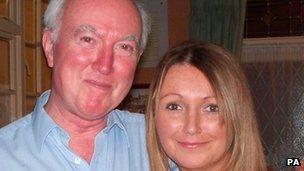Justice committee MPs call for new 'presumed dead' law
- Published
Manic Street Preachers' Richey Edwards' sister Rachel Elias backs law change
The government should change the law to make it easier for families of missing people to deal with their affairs, the Commons Justice Select Committee says.
In a report, it calls for legislation based on Scotland's 1977 Presumption of Death Act to replace a "legislative patchwork" in England and Wales.
MPs say the Ministry of Justice should legislate for a single certificate declaring someone "presumed dead".
The ministry says it will "carefully consider" all the MPs' recommendations.
At present in England and Wales there is no time limit on how long financial affairs remain in a person's name where there is no death certificate. This means life insurance policies that would pay off mortgages cannot be used.
In Scotland it is assumed a court will grant presumption of death after seven years, a system which has "worked cleanly and clearly", committee chairman Sir Alan Beith told BBC Radio 4's Today Programme.
'Convoluted and cumbersome'
Releasing the committee's report, external, the Lib Dem MP said: "We do not agree with government ministers who claim the system is working 'adequately'.
"The evidence we have heard from families faced with the problems of resolving these affairs is overwhelming. The law needs to be changed.
"The government owes it to these families to look at this issue again very carefully before it responds to our report."
The committee launched an inquiry into the law and processes relating to presumption of death in July 2011.
Justice Minister Jonathan Djanogly admitted to the inquiry that the current law was "convoluted and cumbersome" - but he gave no promise that the legislation would change, saying it had worked adequately.
In its report, the committee describes the current law on missing people as "a legislative patchwork of bewildering complexity".
It says families trying to administer their loved ones' affairs are left facing a "confusing, costly and emotionally exhausting legal process".
'Held to ransom'
MPs acknowledge that legislation relating to the affairs of missing people will affect only a limited number of people but say it would allow families in "extremely difficult emotional circumstances" to resolve the financial and legal affairs of missing relatives.
Peter Lawrence: Missing person law makes life hard at "lowest ebb"
The report says that in the 34 years since Scotland brought its Presumption of Death Act into force only one person has reappeared.
Sir Alan said those who suffered the "genuine problem" of someone disappearing and their body being found years later should "not be held to ransom by the fact there has been one or two bad cases".
Under the report's recommendations, families would be able to apply for a presumption of death order seven years after someone went missing.
It says "guardianship orders" based on those in some Australian states should be introduced to allow families to maintain the missing person's estate four years before that.
Martin Houghton, chief executive of the charity Missing People, welcomed the report, saying it was time for the MoJ to "end this suffering once and for all".
"The families tell us that this is an incredibly painful time, when they're trying to work out what's happened to their loved one. Families don't often survive these kinds of circumstances," he told BBC Radio 5 Live.

Peter Lawrence - whose daughter Claudia is missing - gave evidence to MPs during their inquiry
Ann Coffey, chairwoman of the All-Party Parliamentary Group for Runaway and Missing Children and Adults, urged the government to act quickly.
"No family should have to go through such an emotionally exhausting and confusing legal process in addition to having to cope with the loss of a loved one," she said.
The MoJ said it recognised "the emotional and practical difficulties faced by those whose loved ones are missing and thought to be dead".
"We are already working to improve guidance relating to coroners' powers where a person is missing and presumed dead and will look at other areas where guidance could be improved," a spokesman said.
'Can't do anything'
Peter Lawrence, whose daughter Claudia went missing in York in 2009, told the inquiry families had no simple way to deal with unresolved practical issues because they could not prove whether a missing person was dead or alive.
Mr Lawrence said he was "no nearer to knowing" what happened to his daughter but police were "convinced" she was dead.
"Most people, like Claudia, have got a house, a mortgage, bank accounts, bank cards, car, insurance - and you can't do anything with any them because there is absolutely no law in England and Wales at the moment," he told Today.
"There are upwards of 1,000 families going through this at a time when they're emotionally at their lowest ebb."
Rachel Elias, whose brother, Manic Street Preachers guitarist Richey Edwards, went missing on 1 February 1995 at the age of 27, also gave evidence to the inquiry in June last year. She is calling for more rights for the families of missing people.
"I have absolutely no idea either way where Richard is and that is the heartbreaking thing about it," she told Today.
She said she had heard of cases of people losing their homes over the issue.
"There is simply nothing you can do because the person isn't here," she said.
- Published1 March 2011
- Published22 February 2012
- Published16 June 2011
- Published23 November 2011